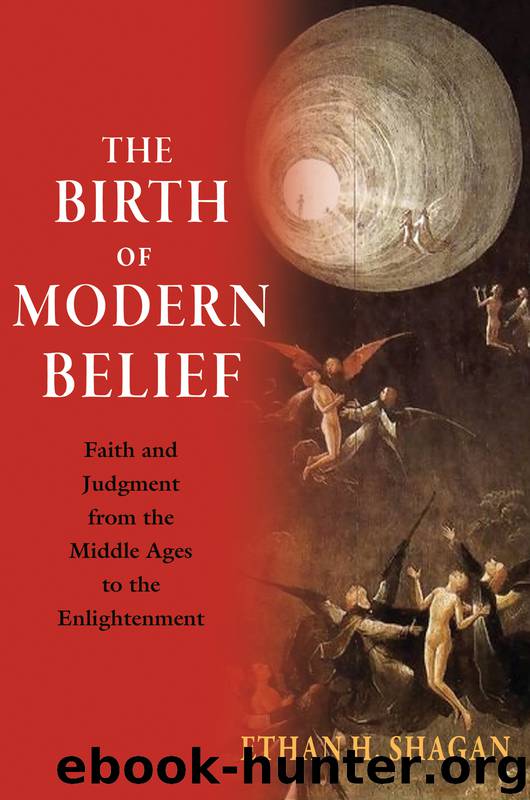The Birth of Modern Belief by Shagan Ethan H

Author:Shagan, Ethan H.
Language: eng
Format: epub
Publisher: Princeton University Press
Published: 2018-10-19T00:00:00+00:00
CHAPTER SIX
Enlightened Belief
IN WHAT SENSE did René Descartes believe in God? The point of asking is not to question whether he believed, like contemporaries who saw the specter of atheism in his mechanical philosophy, but rather to underline the novelty of how he believed.
When Descartes questioned the foundations of all knowledge in his Discourse on Method (1637) and Meditations (1641), he ostensibly exempted Christianity from his investigations. Because the path to heaven “is open no less to the most ignorant than to the most learned,” and because “the revealed truths which lead to it are beyond our understanding,” he would not dare submit Christian truths to his weak powers of reasoning.1 Descartes also practiced obedience, deleting defenses of heliocentrism from his writings after he learned of the Church’s condemnation of Galileo; given his voluntarism, we might generously stipulate that he was not a hypocrite but instead convinced himself to believe with the Church.2 Nonetheless, in his famous experiments in radical doubt, Descartes manifestly submitted authoritative religious truths to the judgment of his own mind, rather than submitting his own mind to the judgment of authority. He could not have done otherwise. His desire to believe only things that were certain and indubitable, and to treat uncertain knowledge as if it were false, created a compelling need for him to generate a beneficent God from first principles, as a rock upon which other knowledge could be built.3 Without that firm foundation, nothing could be certain outside his own mind. Descartes escaped solipsism by reasoning that if his mind could conceive of a being more perfect than itself, then that being must have a real referent, because his mind could not have constructed it from its own inferior resources. And from the premise that all deceit flows from some defect, he concluded that such a perfect being could not be a deceiver, hence God does not systematically pervert human senses. Descartes therefore established, from his own internal resources, the credibility not only of God but of the external world.
Descartes’s decision to submit the Church’s dogma to the judgment of his own mind was therefore not contingent but absolutely central. His argument for God’s existence was not simply one example from a list of things he could prove rationally, but rather was the wellspring of all argument, the fundamental theorem that allowed him to establish secure knowledge in other fields. The whole ground of judgment, for Descartes, was the mind’s capacity to discover a truth external to itself; only after independently proving that God exists could he believe anything else. Descartes’s belief in God thus challenged not only the post-Tridentine emphasis on belief as an act of obedience, but also the framework of his hero St. Anselm—on whose “ontological argument” he based his reasoning—who had famously declared that we “believe in order to understand.” For Descartes, complex acts of ratiocination must necessarily precede belief, and the individual reasoning person must believe for himself if belief is to have any meaning.4
Descartes rode the crest of a wave that was about to break over European Christianity.
Download
This site does not store any files on its server. We only index and link to content provided by other sites. Please contact the content providers to delete copyright contents if any and email us, we'll remove relevant links or contents immediately.
| Africa | Americas |
| Arctic & Antarctica | Asia |
| Australia & Oceania | Europe |
| Middle East | Russia |
| United States | World |
| Ancient Civilizations | Military |
| Historical Study & Educational Resources |
Hostage to the Devil by Malachi Martin(1800)
Dark Mysteries of the Vatican by H. Paul Jeffers(1704)
The Apogee - Byzantium 02 by John Julius Norwich(1442)
Angels & Demons by Dan Brown(1180)
The Secret Teachings of All Ages by Manly P. Hall(1157)
Freedom of the Will by Jonathan Edwards(1125)
The Imitation of Christ by Thomas à Kempis(1077)
The Institutes of the Christian Religion by John Calvin(1073)
Book 2 by Unknown(984)
Christian by Sean Michael(953)
Life Stories by unknow(883)
Hostage to the Devil: The Possession and Exorcism of Five Contemporary Americans by Malachi Martin(880)
Demonology, by King James I(863)
The Nag Hammadi Scriptures by Meyer Marvin W. & Robinson James M(863)
A Cup of Trembling by Dave Hunt(813)
The World's Sixteen Crucified Saviors by Graves Kersey(770)
Heaven and Hell: A History of the Afterlife by Bart D. Ehrman(763)
The Nag Hammadi Scriptures by Marvin W. Meyer & James M. Robinson(739)
Catholicism For Dummies by Rev. John Trigilio Jr. & Kenneth Brighenti(731)
